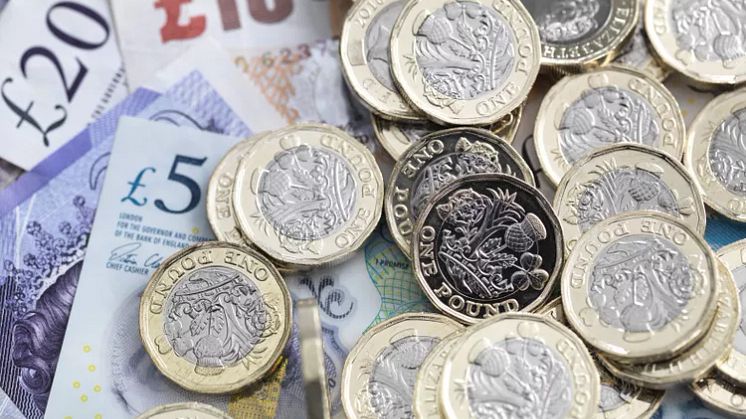
Press release -
Empty Wallet Woes: Brits Caught Out at Supermarkets and Car Parks
- More than half of Brits always carry cash with them when out and about
- Parking the car, tipping and money for the shopping trolley are the top 3 instances where Brits have been caught out by not having cash
- Nearly half are more likely to pay cash at independent stores to support local businesses
Parking the car, tipping and a pound coin for the shopping trolley are amongst the top 10 situations Brits have been caught out by not having cash on hand, according to new research.
A survey of 2,000 adults by Post Office found that despite fears of Britain moving to a cashless society, 55 per cent always or often carry cash with them when out and about, with 25 per cent paying with cash two to three times a week. Of those who regularly pay with cash, 46 per cent typically carry between £11 and £30.
The research also revealed that 16 per cent still keep a reserve of coins hidden in the car and 12 per cent even keep a stash of notes in the bedside drawer - just in case.
Failing technology is a key reason why many Brits like to have a few quid on them – with 38 per cent of those who carry cash doing so in case their card doesn’t work, and 12 per cent carrying it because they are worried about their phone breaking or running out of battery.
While 15 per cent believe using cash instead of bank cards or mobile phones means they are better able to keep track of spending.
But despite a continued reliance on cash, 41 per cent still admit to regularly being caught out without any cash.
While 24 per cent have felt guilty being cashless when they’ve wanted to tip someone and 20 per cent have been unable to pay for parking at a cash-only carpark. And many have been unable to use gym lockers, vending machines or amusements at an arcade due to having an empty wallet or purse.
Ross Borkett, Banking Director at Post Office, which commissioned the study, said: "This research highlights that despite us living in a world driven by technology, there is still a need for physical cash.
“There are many scenarios where cash is still king, whether that’s tipping a waiter, donating to someone on the street, or buying something at a car boot sale or school fete. The fact is that we are not yet a cashless society, and cash is used a lot more than people think. Pounds and pennies are used in so many instances, every single day.
“Although half of Brits still carry cash, not everyone is aware that Post Office offers free cash withdrawals at all branches across the UK.”
Many of those polled appreciate that their use of cash aids the UK’s economy – with 46 per cent of those who are more likely to pay cash at independent stores (44 per cent) doing so to support local businesses.
56 per cent said ‘it’s important to have access to cash when they need it’.
And on the high street, over half of customers prefer using cash to card in newsagents (58 per cent), charity shops (57 per cent) and convenience stores (54 per cent). While others like to support local businesses in this way by spending cash in the bakery (52 per cent), greengrocers (38 per cent) and hairdressers or barbers (37 per cent).
Brits are also driven by kindness, as their desire to carry money is also because they’d like to donate to charity (35 per cent) or give some to a homeless person (22 per cent).
Other scenarios people like to carry cash for include paying for goods at a market (30 per cent), buying ice cream from a van (27 per cent) and spending at a local fete (25 per cent).
Dr Christian Bach, Associate Professor in Economics, University of Reading, said:
“When consumers pay with cash, they physically hand over something they own. This act creates what behavioural economists call the ‘pain of paying’ – activating the brain’s pain centres and curbing impulse spending. By contrast, digital payments lack sensory depth and leave no physical trace.
“As a result, the natural restraint on spending is weakened, and indeed, studies show that people spend more – and more recklessly – when using digital payments.
“Cash also fuels local economic growth, as spending cash locally keeps money circulating in the community, boosting nearby businesses and jobs. Small firms, independent shops, and vendors often rely on cash for its immediacy, simplicity, and inclusiveness.
"As Post Office's data shows, cash continues to play a vital role in the UK economy and remains essential to the health of small businesses. While digital payments can offer convenience, cash is capable of strengthening local economies, supporting financial wellbeing, and encouraging more mindful spending.”
TOP 30 PLACES BRITS LIKE CASH TO HAND
- Tipping
- A pound coin for the shopping trolley
- Giving money to a charity collection box
- Paying for something which costs less than £5
- Paying for goods at a market
- Paying for parking in a car park
- Buying an ice cream at an ice cream van
- Paying for goods at a local fete
- Paying for goods at a car boot sale
- Giving money to a homeless person
- When gifting cash for someone’s birthday
- Using a vending machine
- Paying for goods at independent shops
- Paying for a taxi
- A pound coin for the locker at a gym/leisure centre
- Buying a newspaper
- Using machines in an arcade
- Paying for goods at a school fair
- Buying goods from a food truck
- Paying for public transport
- Paying a tradesperson
- Paying for goods on my local high street
- Giving money to buskers/performers
- To buy myself a treat (e.g. a chocolate bar without feeling like I’m spending)
- Paying for a car wash
- Buying a drink at a pub
- Paying for a takeaway coffee
- Paying for rides/games at a local amusement park (e.g. a pop-up fair in the summer)
- Giving my children pocket money
- Paying a friend money, I owe them
ENDS
Source: A OnePoll survey of 2,000 UK adults aged 18 and over (nationally representative on the basis of age, gender, and region).
About the Post Office
- With over 11,500 branches, Post Office has the biggest retail network in the UK, with more branches than all the banks and building societies combined.
- Post Office is helping anyone who wants cash to get it whichever way is most convenient. Partnership with over 30 banks, building societies and credit unions means that 99% of UK bank customers can access their accounts at their Post Office.
- Cash withdrawals, deposits and balance enquiries can be made securely and conveniently over the counter at any Post Office; and the biggest investment by any organisation or company in the last decade is being made to safeguard 1,400 free-to-use ATMs across the UK.
- Post Office is simplifying its proposition for Postmasters with a focus on its cash and banking; mails and parcels; foreign exchange; and; bill payments services.
- Research has found that visits to the Post Office help drive another 400 million visitors to other shops, restaurants and local businesses equating to an estimated £1.1 billion in additional revenue for High Street businesses.
- 99.7% of the population live within three miles of a Post Office; and 4,000 branches are open seven days a week.




